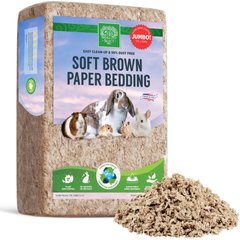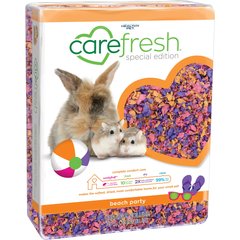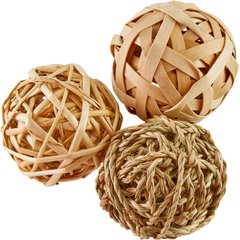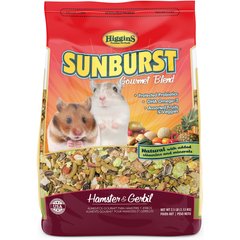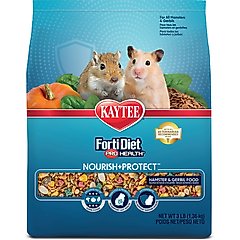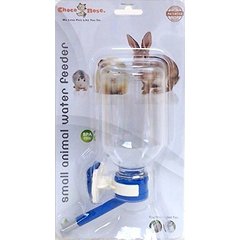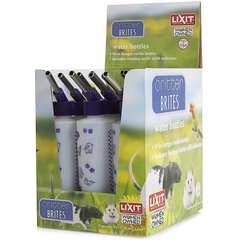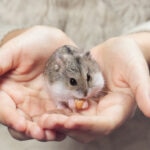Pet Hamsters 101: A Beginner’s Guide to Hamster Care
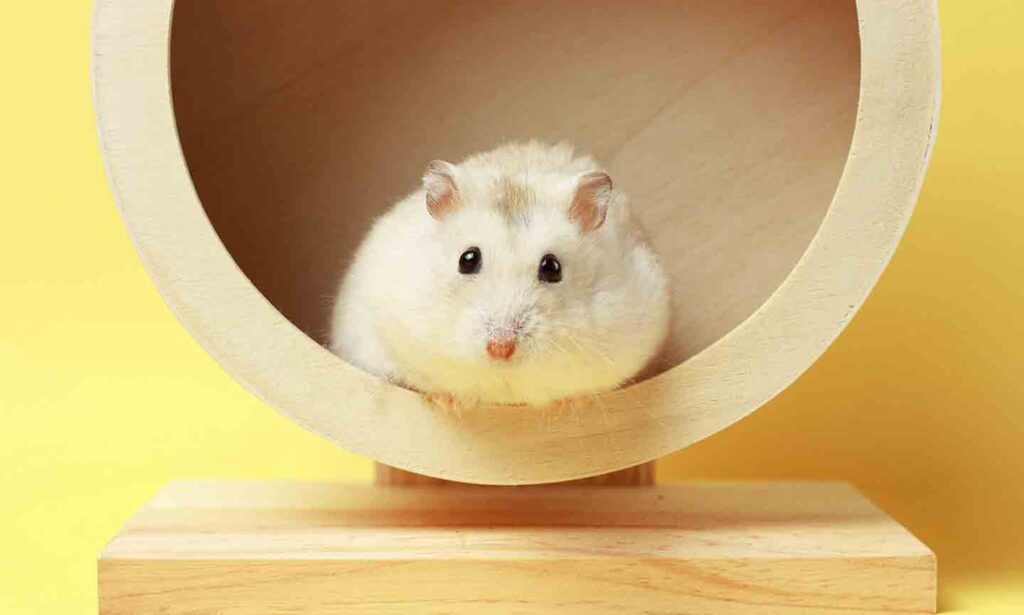
Photo by Tatiana/iStock/Getty Images Plus
Though smaller and generally less expensive to keep than dogs and cats, hamsters require focused care like any other pet. From necessary supplies to diet tips and common health issues, this guide will serve to introduce you to the basics of hamster care.
Hamsters: An Overview
- Scientific name: Order Rodentia, subfamily Cricetinae
- Size: 2-13 inches
- Life expectancy: 1.5-3 years
Fun Hamster Facts
- The word “hamster” is derived from the German verb hamstern, meaning “to hoard.”
- Hamsters can only see in black and white, and their vision is limited to a few inches ahead.
- The most popular pet hamster is the Syrian or golden hamster (Mesocricetus auratus).
- A hamster’s teeth grow continuously throughout their life—chewing helps hamsters keep their teeth ground down to a manageable size.
Hamster Care Supply Checklist
As a hamster caregiver, you’re responsible for meeting your new pet’s needs for a safe and clean habitat, a healthy diet, opportunities for enrichment, and routine veterinary care.
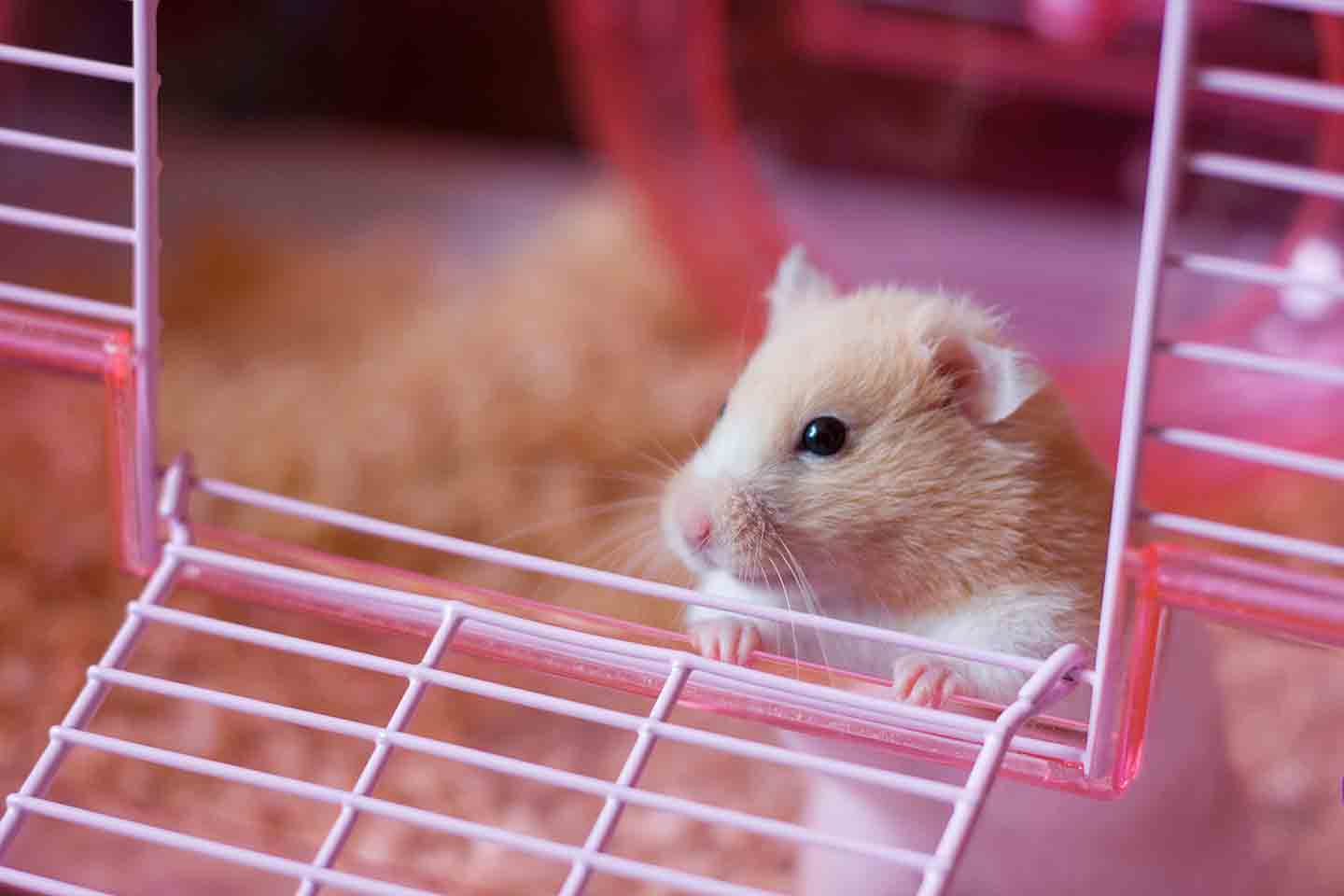
abalcazar/E+
Habitat
Consider your hamster’s habitat an investment in their health and happiness. Your hamster will spend the majority of their life in an enclosure, so it’s important to put careful thought into choosing, decorating, and maintaining it.
Choosing an Enclosure
When choosing a hamster enclosure, size is the most important consideration. Dwight Alleyne, DVM, a senior associate veterinarian at Petfolk, in Marietta, Georgia, says, “Cages for hamsters should be of an appropriate size to allow for them to burrow, climb, and run as needed.”
Dr. Alleyne recommends minimum cage dimensions of 24 inches long, 12 inches wide and 12 inches high—that’s at least 288 square inches of floor space. Bigger is better, however, so size up if it’s within your budget to do so.
The ideal type of habitat depends on the species of hamster you have. Wire cages may be appropriate for larger species like Syrian hamsters, who won’t be able to squeeze through the bars. For smaller species like Roborovski dwarf hamsters, however, solid enclosures similar to aquariums will be more secure.
Hamsters are notorious for being talented escape artists. Mind the spacing of bars and gaps in your hamster cage but, most importantly, ensure the habitat has a tight-fitting top. Cage doors should snap securely shut or have latches or clips to keep them closed.
Recommended Products
Bedding Material
Hamsters are burrowers who dig tunnels and chambers for hiding, sleeping, and storing food. Your hamster’s cage should be large enough to accommodate separate spaces for each of these activities and deep enough to fill with several inches of bedding or substrate.
Hamster bedding should be soft enough for your hamster to dig through. Spruce or aspen shavings work well, but avoid soft wood shavings like cedar and pine. These shavings have a strong odor and may release chemicals that could irritate or damage your hamster’s lungs.
Paper or fiber-based bedding like Carefresh Small Animal Bedding is safe for hamsters. As an economical option, you could also use clean paper towels, recycled newspaper, or unused toilet paper.
Recommended Products
Decor and Accessories
Decorating your hamster cage should be fun—but be mindful of overcrowding it with accessories your hamster can’t safely use or won’t enjoy. Choose add-ons that provide opportunities for exercise, enrichment, or security.
Jason Sweitzer, DVM, a veterinarian and member of the California Hamster Association in Los Angeles, says, “Hamsters may like wheels, but they definitely need a lot of different things to chew and interact with.”
A hamster wheel is non-negotiable, but your hamster may also like having things to climb, places to hide, and things to chew on. Chewing serves a practical purpose for hamsters—it helps keep their continuously growing teeth filed down—and it also helps relieve boredom and stress.
To foster an interactive and enriching environment, Dr. Alleyne recommends incorporating numerous textures and materials. “This can involve a variety of toys, tunnels, and climbing structures to support [the hamster’s] natural behavior,” he says. “These decorations should be rotated on a regular basis to keep the environment stimulating.”
Recommended Products
Cage Cleaning and Maintenance
A poorly maintained habitat puts your hamster at risk for disease.
“A hamster cage should be spot-cleaned daily by removing soiled bedding and uneaten food,” says Dr. Alleyne. He recommends changing out the bedding weekly and disinfecting the cage with a mild detergent. It’s also important to clean food and water containers regularly.
If you have a modular hamster home that includes extensions like the Kaytee CritterTrail habitat, you may need to remove the extensions for cleaning. Place your hamster in a temporary cage or carrier and clean the extensions with warm soapy water or disinfectant.
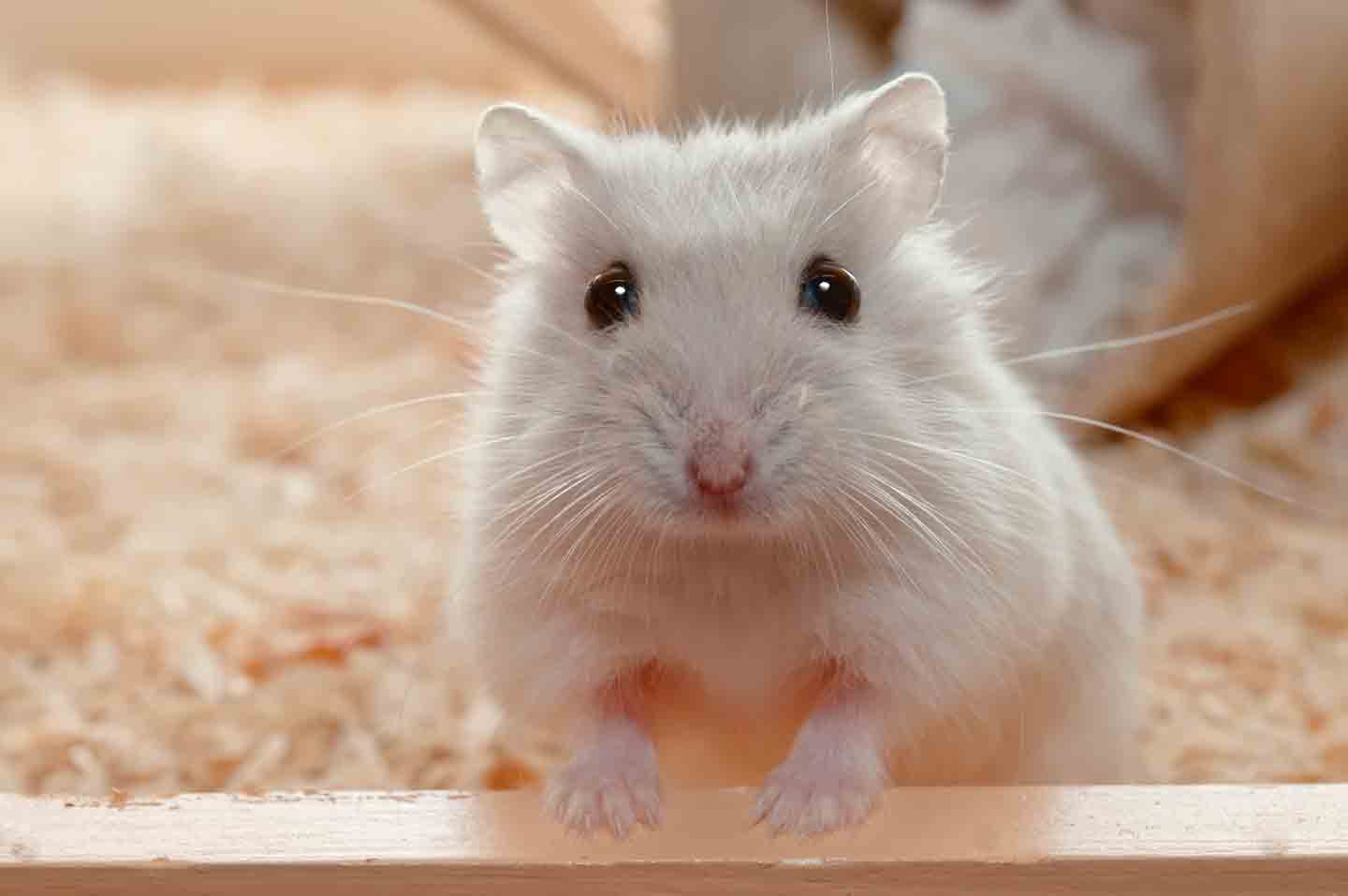
Kerrick/E+
Diet
Though their care requirements are similar, hamsters have different nutritional needs than other small pets like gerbils and guinea pigs. Offering a balanced diet is the key to ensuring your new hamster’s long-term health.
What Do Hamsters Eat?
Wild hamsters are omnivores, known for stuffing their cheek pouches with just about any food they can find—primarily plants and insects. A healthy pet hamster diet should mimic the variety and nutritional balance of a wild hamster diet.
“A balanced diet for hamsters involves a high-quality food mix with a variety of seeds, grains, and pellets,” says Dr. Alleyne. He recommends supplementing commercial hamster food with fresh fruits and vegetables like apples, cucumbers, broccoli, and carrots. Hamsters can safely consume small amounts of dried insects and cooked animal protein—like hard-boiled egg or unseasoned chicken—but a balanced plant-based diet can adequately meet their protein requirements.
Commercial hamster food like Higgins Sunburst Gourmet Blend is formulated to meet your hamster’s core nutritional requirements. These diets typically include a combination of foods like seeds, dried fruits and vegetables, and pelleted food.
Recommended Products
How Often To Feed Your Hamster
Feed your hamster once a day, placing the food bowl in part of the habitat away from where your hamster sleeps and eliminates. Because hamsters are nocturnal, they tend to forage for food at night. That said, you can refresh the food on whatever schedule works for you. Just be sure to clean the bowl before refilling it, and throw away any leftover food and treats your hamster may have hidden away.
Hamster Water Requirements
Fresh water should be available to your hamster at all times. Hamsters will drink from water bowls as well as bottles. If you use a water bowl, however, you may need to change the water frequently if food or bedding ends up in the bowl. If you use a water bottle, consider a no-drip small animal bottle—drips lead to damp bedding that could make your pet hamster sick.
Recommended Products
Poisonous/Toxic Foods for Hamsters
Supplementing your hamster’s diet with fresh food is a great way to boost their nutrition. It can also provide enrichment, giving your hamster new flavors and textures to explore. Before adding anything to your hamster’s diet, however, be sure it’s safe.
The following foods are unhealthy or toxic to hamsters and should never be fed to them:
- Almonds
- Avocado
- Candy and chocolate
- Chives and scallions
- Citrus fruit
- Eggplant
- Fruit pits and seeds
- Garlic
- Kidney beans (raw)
- Leeks and onions
- Pickles
- Potatoes (raw)
- Rhubarb (raw)
- Salty foods
- Spices
- Sugary foods
- Tomato
While some human foods like dried fruit, nuts, and dairy products may technically be safe for hamsters, foods high in calories, fat, or sugar should only be fed to them rarely and in small amounts.
Handling Your Hamster
When you first bring home your hamster, it’s important to give them time to adjust to their new environment. After a few days, however, you can begin to spend time with your pet.
How much your hamster likes being handled may depend on the species. “In general, the smaller the hamster, the less likely they are to want to be handled,” says Dr. Sweitzer. “The larger ones tend to be a little easier to socialize.”
How To Hold Your Hamster
Always wash your hands before handling your hamster, using unscented soap if possible. Wait until your hamster is active to pick them up. If they’re sleeping, wake them gently by speaking to them in a soft voice.
Place your hand in the enclosure for a few seconds before trying to pick up your hamster—don’t sneak up on them or chase them around the cage. As you lift them, make sure they’re facing toward you, not toward open space.
Hold your hamster with both hands, cradling their bottom with one hand for support. Keep a firm hold but don’t squeeze them too tightly.
Safety Tips for Handling Hamsters
Keep in mind that hamsters are prey animals and may be frightened by sudden movements or loud noises. Be gentle when picking up your hamster and never corner them in their cage. If your hamster appears to be distressed, return them to the cage immediately.
“Hamsters do not necessarily require regular handling,” says Dr. Alleyne, “though social interaction can help with fearful or aggressive responses.” If your hamster doesn’t enjoy being handled—or if you’re worried they might escape—simply spending time together while they are in their cage is a perfectly acceptable alternative.
Maintaining Your Hamster’s Health
As you care for your hamster, be watchful for signs of illness and have a plan in place should your hamster require veterinary care.
Signs of a Healthy Pet Hamster
“A healthy hamster should have a shiny, clean coat,” says Dr. Alleyne, “have eyes that are bright, be very active in exploring their environment, and exhibit normal grooming habits such as cleaning their face and grooming their fur.”
Spending time with your hamster is key to becoming familiar with and developing a baseline for their normal behavior. Minor health problems can quickly turn serious in small animals, so it’s important to be vigilant and to notice changes as early as possible.
Common Health Problems
Health issues in hamsters are often linked to poor husbandry (care and maintenance) or improper diet. According to Dr. Alleyne, some of the most common health problems in hamsters are “digestive conditions such as wet tail [characterized by severe diarrhea], skin problems due to mites, and dental issues due to overgrown teeth.” All of these conditions require prompt veterinary attention.
A sick hamster may show reduced interest in food and exercise. In cases of respiratory illness, you may notice wheezing, sneezing, or discharge from the eyes or nose. Changes to the quality of your hamster’s coat, like hair loss or signs of poor grooming, may also indicate illness.
When To See Your Vet
Preventive care is key to keeping your hamster healthy and maximizing their lifespan. Dr. Sweitzer recommends an annual exam with a small pet or exotics vet to identify problems with your hamster early. “Plus, if you get an exam when they are healthy,” he says, “it’s easier to get in and know where to go if an emergency health problem happens.”
Outside of annual checkups, you should take your hamster to the vet if you notice sudden or significant changes to their appearance, appetite, behavior, or breathing.
FAQs About Hamster Care
Are hamsters easy to take care of?
What is a hamster’s daily routine?
What can I do with a pet hamster?
With the basics of hamster care under your belt, you’re off to a great start as a dedicated hamster parent. If you want to give your hamster a long and healthy life, brush up on the details of a balanced diet for hamsters. Learn more about what to feed a hamster.
Expert input was provided by Dwight Alleyne, DVM, a senior associate veterinarian at Petfolk, in Marietta, Georgia; and Jason Sweitzer, DVM, an associate veterinarian at Moorpark Veterinary Hospital and member of the California Hamster Association, in Los Angeles, California.
This content was medically reviewed by Chewy vets.



